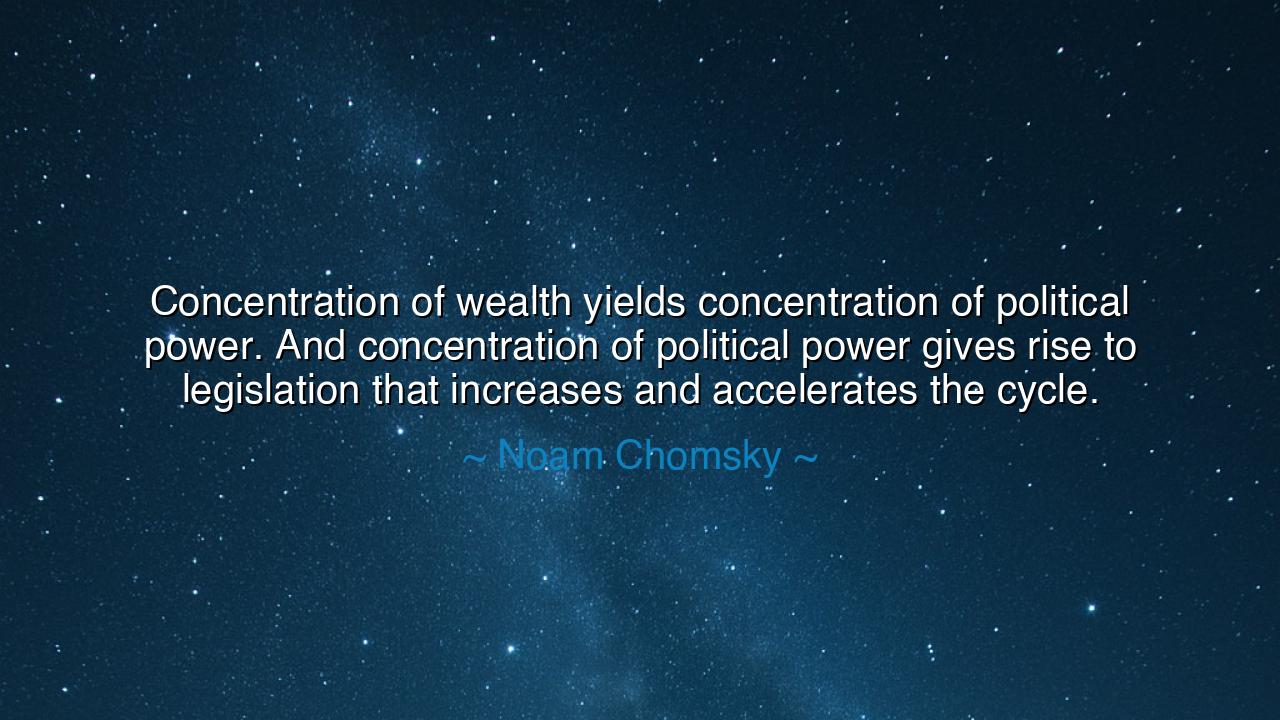
Concentration of wealth yields concentration of political power.
Concentration of wealth yields concentration of political power. And concentration of political power gives rise to legislation that increases and accelerates the cycle.






In the words of Noam Chomsky—“Concentration of wealth yields concentration of political power. And concentration of political power gives rise to legislation that increases and accelerates the cycle.”—we are warned of a cycle as ancient as civilization itself. The gathering of wealth in the hands of the few does not remain still; it spills into the realm of power, shaping laws and institutions. And those laws, crafted by the powerful, ensure that the circle tightens, that the strong grow stronger while the weak are left further behind.
The ancients saw this pattern clearly. In Rome, the vast estates of the patricians swallowed the small farms of the plebeians, who, crushed by debt, lost both land and liberty. The Senate, dominated by the rich, passed laws that secured their own estates while offering little to the poor. The cycle fed upon itself until it birthed civil strife, the cries of the Gracchi brothers, and, at last, the collapse of the Republic into empire. Thus Chomsky’s words echo with the weight of history: when wealth and power fuse, justice falters.
The cycle is dangerous not only because it breeds inequality, but because it cloaks itself in legitimacy. Legislation, born of corrupted power, appears lawful, yet it is the law of the few, not of the many. The people are told that justice has spoken, when in truth it is privilege that has written the decree. This is why Chomsky speaks with urgency: the cycle, once begun, accelerates, until freedom itself is devoured.
History offers warnings from beyond Rome. In pre-revolutionary France, nobles and clergy hoarded wealth and shaped laws to protect their privileges, while peasants carried the weight of hunger and taxation. The cycle tightened until it could tighten no more, and the fury of the Revolution shattered it with fire and blood. Thus, when wealth and power intertwine without check, the end is not stability but upheaval.
Therefore, let us learn: guard always against the concentration of wealth and power, for their union is the death of liberty. A just society requires balance, the dispersal of influence, the vigilance of the people. For once the cycle begins, it feeds itself like a storm, growing until it consumes all in its path. The wisdom of the ages agrees with Chomsky’s warning: freedom is not lost in one blow, but in the slow turning of this cycle, unless the people break it with justice and vigilance.






TThy
Chomsky’s quote about the cyclical relationship between wealth and political power seems to explain much of the inequality we see today. If legislation is crafted to benefit the wealthy, how can ordinary people ever hope to influence meaningful change? What role do grassroots movements and activism play in breaking this cycle, and is it even possible to overcome such entrenched systems?
TPHo thi phien
Chomsky’s statement about wealth leading to political power and subsequently reinforcing this cycle makes me question the fairness of our current political system. Can true change occur when the laws and regulations are consistently shaped by the interests of the wealthy few? What would it take to create a system where wealth doesn’t automatically translate into political influence and vice versa?
MTNguyen Ba Minh Thang
The idea that wealth concentration drives political power and legislation that perpetuates the cycle is a striking one. Does this mean we are trapped in a feedback loop that keeps the rich getting richer while the rest of society remains powerless? Is there a way to shift this dynamic, or do we need a fundamental rethinking of how wealth and politics are structured in society?
BTPham Thi Bao Tram
Chomsky’s perspective on wealth concentration influencing political power feels like a critique of how modern capitalism operates. It makes me wonder, can this cycle of wealth and power ever be truly broken? Is the political system designed in such a way that it inevitably benefits the wealthy, regardless of who holds office? How much of this concentration is by design, and how much is a result of systemic flaws?
Bbolis
Noam Chomsky’s quote about the cycle of wealth concentration and political power raises an important issue. How does this concentration affect democracy? If wealth directly influences political power, are we truly living in a system where all voices are equal? Can we break this cycle, or is it simply an inherent flaw in the structure of modern economies and political systems?